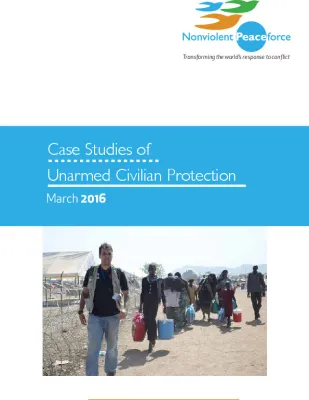Unarmed civilian protection (UCP) is an emerging methodology for the direct protection of civilians, for localized violence reduction and for supporting local peace infrastructures. UCP provides unarmed, specially trained civilians, recruited from many countries and cultures to live and work with local civil society in areas of violent conflict. It has grown in practice and recognition in the last few decades, with over 50 civil society organizations applying UCP methods in 35 conflict areas since 19901. UCP is not appropriate in every conflict situation and should only be used by practitioners who have had proper training and have ongoing strategic supervision. UCPs should be deployed in close collaboration with local civil society after a comprehensive conflict analysis and practicing the principles of Do No Harm. UCP can be applied at all stages of a conflict, but it can be particularly effective at an early stage, to prevent or mitigate violent conflict, and also after violent conflict has subsided, to support the transition to healthy civil society. UCP can work in conflict areas where no UN peacekeepers are present (e.g., Mindanao, Myanmar, Colombia) but also, in a complementary manner, with UN missions (e.g., South Sudan). The concept of UCP contributes to several discourses taking place at the UN and elsewhere, including Women, Peace and Security; Protection of Civilians; Children in Armed Conflict; Mediation; Human Security; and Peacebuilding. These discourses, in turn, lend further support and legitimacy to the practice of UCP.
Publisher(s)
Publication year
2016
Abstract
ACCESS
File
Document
RS973_?fwp_brief_resource_type=case-study.pdf
(586.54 KB)
Access
“Open” means that the resource is available to view, but please check the weblink for restrictions on use. “Restricted” means that the resource is not openly accessible to all, but you can purchase a copy, or your organisation might have an institutional subscription.
FURTHER INFORMATION
Source type
Keywords
Organisation(s)
Country
Language(s)
